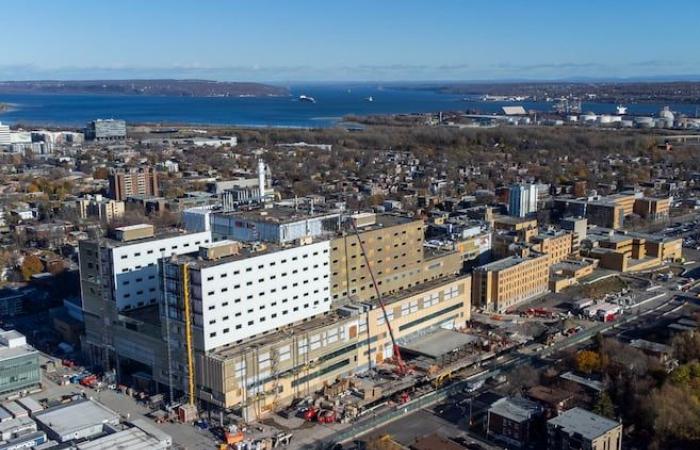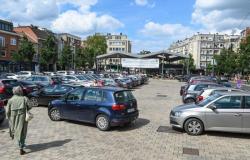The said “project” is both simple and complex: the City of Quebec wants to see new hotels grow on its territory. But not just anywhere.
“There is a need to be filled in terms of developing the commercial tourist accommodation offer,” explains the municipal councilor responsible for tourism and urban planning to the executive committee of the City of Quebec. Mélissa Coulombe-Leduc, in interview at Soleil.
Airport, Lebourgneuf, head of the bridges and… megahospital
The Marchand administration aims to “concentrate the hotel industry in certain sectors with higher commercial density”.
Already, it has identified three areas in clear view of hoteliers: the airport sector, the head of the bridges and Lebourgneuf, near the Galeries de la Capitale.
The Head of Bridges sector is targeted by the Marchand administration to accommodate a new hotel development. (Caroline Grégoire/Archives Le Soleil)
According to information from SoleilQuebec has so far received permit requests from developers, information that the City however refuses to confirm.
Other sectors could also be added to those determined. Like near the new Enfant-Jésus hospital complex, in the Maizerets district.
“We can think that this will bring demand to the Henri-Bourassa sector, because a new mega-hospital center means people who are possibly arriving from eastern Quebec, from Saguenay, and who need to find accommodation,” confirms Mélissa Coulombe. Leduc.
No more demand, no more “illegality”
Year after year, the capital rises in the top 3 of the most popular tourist destinations in Canada. Except that faced with this “growing attraction”, it is struggling to meet the demand for tourist accommodation.
The industry estimates that around 1,000 rooms could be added in Quebec and would not be refused.
In recent years, the popularity of booking accommodation on online platforms such as Airbnb has continued.
However, commercial tourist rental, which involves renting short-term accommodation in a place which is not the main residence of the host – such as a hotel or a building held for these purposes – is not permitted everywhere on the territory.
But faced with an undeniable windfall, owners are doing it illegally, without a permit or in non-compliance with the planned zoning.
“When there is illegality in tourist accommodation, it is often because there is very high demand and we are not able to meet it,” analyzes the elected representative of the team of Mayor Bruno Marchand. We think that by increasing supply, it can help reduce the phenomenon of illegality.”
Under construction since 2019
To respond, precisely, the former municipal administration began a regulatory review in 2019 to guide the development of future commercial accommodation. But the “construction site” never came to fruition, particularly due to the pandemic crisis.
Since then, the development of the offer has been “put on ice”. Projects have been frozen pending a conclusion of the file. “There are almost no hotels that have been able to be built in Quebec,” notes Ms. Coulombe-Leduc, avoiding however to speak of a necessary “catching up”.
During the same period, however, the context has “changed a lot in relation to the housing crisis”, also underlines the municipal representative of the district of Cap-aux-Diamants, in the heart of the city center.
It therefore becomes imperative to “protect existing housing and strengthen living environments,” she argues.
“We want to further develop the commercial tourist accommodation offer in the territory of Quebec City, but not to the detriment of the residential park.”
— Mélissa Coulombe-Leduc, responsible for tourism and urban planning on the executive committee of the City of Quebec
The City therefore resumed the consultation process in all boroughs this fall and will complete it at the beginning of 2025.
“If the zoning process moves forward,” citizens in various sectors can expect to see new hotels spring up.
But one thing is certain, says Ms. Coulombe-Leduc, “not in residential areas”.
In the city center, the tightening began last year in Saint-Roch, to limit the presence of buildings whose units are subject to short-term rental. It remains the district where there are the most listings on Airbnb, ahead of Old Quebec and Saint-Jean-Baptiste.
The hotel industry applauds
The upcoming addition of new hotel complexes is applauded by the Quebec City Region Hotel Association.
“We know that in a few years, we will have to have more hotel offerings, because since the post-pandemic return, Quebec continues to gain momentum,” observes the general director, Alupa Clarke.
“Are there any rooms currently missing? No. But tomorrow morning, yes,” he anticipates.






